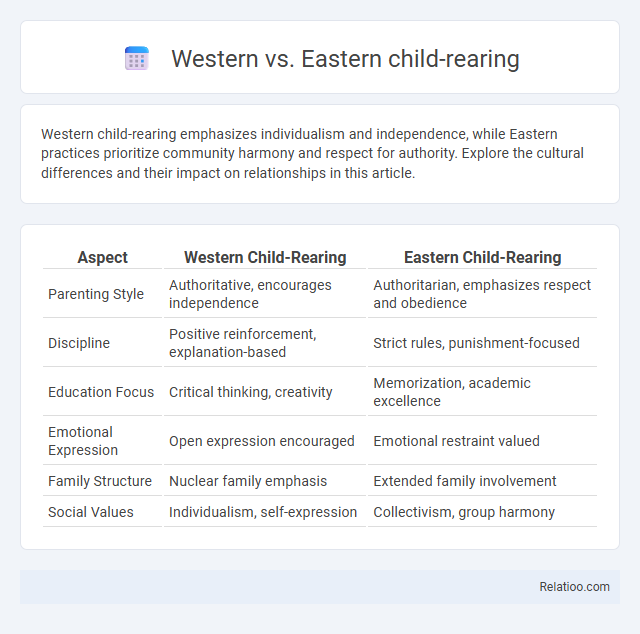Western child-rearing emphasizes individualism and independence, while Eastern practices prioritize community harmony and respect for authority. Explore the cultural differences and their impact on relationships in this article.
Table of Comparison
| Aspect | Western Child-Rearing | Eastern Child-Rearing |
|---|---|---|
| Parenting Style | Authoritative, encourages independence | Authoritarian, emphasizes respect and obedience |
| Discipline | Positive reinforcement, explanation-based | Strict rules, punishment-focused |
| Education Focus | Critical thinking, creativity | Memorization, academic excellence |
| Emotional Expression | Open expression encouraged | Emotional restraint valued |
| Family Structure | Nuclear family emphasis | Extended family involvement |
| Social Values | Individualism, self-expression | Collectivism, group harmony |
Introduction to Western and Eastern Child-Rearing
Western child-rearing emphasizes fostering independence, critical thinking, and self-expression, encouraging children to develop personal autonomy and creativity. Eastern child-rearing focuses on respect for authority, family harmony, and social responsibility, promoting obedience and collective well-being. Understanding these cultural differences is essential for tailoring Your parenting approach to align with desired values and developmental goals.
Core Philosophies in Parenting Approaches
Western child-rearing emphasizes fostering independence and self-expression, encouraging children to develop critical thinking and individualism through open communication and autonomy. Eastern parenting practices prioritize respect for authority, family cohesion, and social harmony, often highlighting obedience and interdependence as core values. Your approach to parenting can balance these philosophies by nurturing your child's personal growth while maintaining cultural respect and connectedness.
Family Structure and Roles
Western child-rearing practices often emphasize nuclear family structures, promoting independence and self-expression in children, with parents typically sharing caregiving responsibilities equally. Eastern child-rearing tends to focus on extended family involvement, where hierarchical roles and respect for elders shape the upbringing and collective decision-making. Your approach to child-rearing may benefit from blending these family structures and roles to balance autonomy and community support.
Discipline Methods and Practices
Western child-rearing discipline methods often emphasize positive reinforcement, promoting autonomy and encouraging open communication to guide behavior. Eastern child-rearing practices tend to prioritize respect for authority and collective harmony, using more structured and sometimes stricter discipline techniques to instill discipline. Your understanding of these contrasting approaches can help tailor effective strategies that balance firmness with empathy in your child's development.
Educational Priorities and Expectations
Western child-rearing often emphasizes fostering independence, critical thinking, and creativity, prioritizing educational practices that encourage self-expression and problem-solving skills. Eastern child-rearing typically values discipline, respect for authority, and academic excellence, with a strong focus on memorization, conformity, and achieving high test scores. These differing educational priorities shape expectations, where Western cultures promote exploratory learning, while Eastern approaches stress rigorous study habits and persistence.
Emotional Expression and Communication
Western child-rearing practices emphasize open emotional expression and verbal communication, encouraging children to articulate feelings and engage in direct dialogue with caregivers. In contrast, Eastern child-rearing often prioritizes emotional restraint and nonverbal cues, fostering harmony and indirect communication within family dynamics. These cultural differences shape emotional development, with Western methods promoting assertiveness and Eastern approaches enhancing social sensitivity and emotional regulation.
Autonomy vs. Collectivism in Child Development
Western child-rearing emphasizes autonomy by encouraging independence, self-expression, and decision-making skills, fostering individualism. In contrast, Eastern child-rearing prioritizes collectivism, promoting interdependence, family harmony, and respect for authority to strengthen group cohesion. These differing approaches shape children's social behaviors, emotional regulation, and identity formation according to cultural values.
The Role of Tradition and Modernity
Western child-rearing practices emphasize individuality and critical thinking, often blending modern psychology with evolving social norms, while Eastern child-rearing heavily incorporates tradition, valuing respect, family cohesion, and obedience. Your child's development may be influenced by these contrasting approaches, where Western methods encourage self-expression and Eastern practices prioritize collective harmony. Balancing tradition with modernity in child-rearing shapes unique cultural identities and adaptive skills crucial for today's globalized world.
Impacts on Children’s Social Skills and Success
Western child-rearing practices often emphasize independence, self-expression, and assertiveness, fostering children's confidence and social adaptability in diverse settings. In contrast, Eastern child-rearing typically prioritizes obedience, respect for authority, and group harmony, which cultivates strong interpersonal relationships and collective problem-solving skills. These differing approaches significantly influence children's social skills development and long-term success, with Western methods promoting individual achievement and Eastern practices enhancing communal cooperation.
Bridging Cultures: Hybrid Approaches to Parenting
Western child-rearing emphasizes independence and self-expression, while Eastern practices prioritize respect, obedience, and community values. Hybrid approaches to parenting integrate these philosophies, fostering emotional intelligence and adaptability in children by blending autonomy with cultural respect. Your ability to adopt a culturally sensitive, balanced strategy can enhance child development and family harmony across diverse environments.

Infographic: Western vs Eastern child-rearing
 relatioo.com
relatioo.com